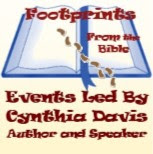The response of “Let Go and Let
God” can happen when we come to the point where we are at “loose ends” and
don’t know what to do next or what will happen in our lives. One definition is
that when we are at loose ends, we are restless or unsettled. That was
certainly true for a couple of Bible heroes: Joseph, son of Jacob and Abigail,
wife of David.
Joseph’s story is found in
Genesis. He was the son of Rachel, Jacob’s beloved wife. His father’s
favoritism led to jealousy among his 10 half-brothers. They threw him into an
empty cistern and then sold him into slavery. (Genesis 37:18-28). That wasn’t
the end of Joseph’s troubles. False accusations put him in prison, where he
certainly was at loose ends. He was sure that he’d never get out of prison
and never see his family again. (Genesis 39:29f)
Abigail, on the other hand, was
married to a rich man who was selfish. She was secure and privileged. Then David, an
outlaw from the court of Saul, sent a messenger to Nabal asking for supplies
because he had protected Nabal’s flocks in the wilderness. When Nabal refused,
she found herself unsettled and realized she had to take action to protect the family. (I Samuel 25:14-31) When she told
her husband what she had done, “his heart died within him, and he became as a
stone…and he died” (I Samuel 25:37-38). This left her completely at loose ends
without protection of a husband.
Even though both these Bible
heroes thought that their life was unsettled permanently. God, knew there
was a lot more to the story. Joseph was destined to be the governor of Egypt to save his family (and the nation of Egypt)
from the effects of a famine. David sent for Abigail and she became his wife
and support during his time of exile and kingship.
There is a positive side to
being “at loose ends”, though. It is the opportunity that is hidden in being unsettled. Maria in The
Sound of Music says, "When the Lord closes a door, somewhere he opens a
window.” That is true for us today and it was true for men and women in the
Bible. We can get so focused on looking at the closed door that we forget to look
around for the open window.
At least I know that’s true for me. Only when I let
go of my plan of using the obvious ‘door’ can I see the wide open window. I
love this picture I found online because it shows that the door is the
narrowest way to get to the other side. In reality, in God’s will, the wall is
entirely open! There have been times when I’ve
felt at ‘loose ends’-unsettled and uncertain about what the next step was.
There have been times when I’ve felt that there couldn’t possibly be another
step because the road is a dead
end. Usually those are times when the Lord has a new direction for my walk, but
I have to “Let Go” before God can work. When I quit pounding the closed door and look around, I can see the opportunity for a new direction.
Joseph and Abigail discovered
opportunity in the ‘loose ends’ of their lives. Joseph, in Egypt,
realized that his life as the favored son of a sheik in Canaan
was over. Then he was able to be open to God’s plan. Only then could God place
him in a position of power and restore his family. In my novel, It is I, Joseph he is torn between
reconciliation with his brothers or revenge and decides on reconciliation (after
he puts them to a little test-see Genesis 44:1-45:8). Joseph has come to
understand that “it was not you who sent me here, but God.”
Abigail was at ‘loose ends’ after
Nabal died. She was unable to imagine what would happen to her as a widow. Then,
“David sent and wooed Abigail, to make her his wife…and [she] became his wife.”
God had a new opportunity as the support and love of David’s life. In My Abigail she gives him wise counsel
during his time of exile, and this is because she learned to be strong and wise
as the wife of the ‘foolish’ Nabal.
When my life is at ‘loose ends’,
it is never a comfortable experience. Looking at Bible heroes helps me
understand that very often that is the way God works and where the open window
of opportunity can be found. If you feel like your life is ‘at loose ends’,
look around for that window and see what opportunities God has in store for
you.
There is an even worse feeling than being at loose
ends. That is ‘being at the end of your rope’. We’ll look at a couple of Bible
heroes that found themselves in that position, next time.





